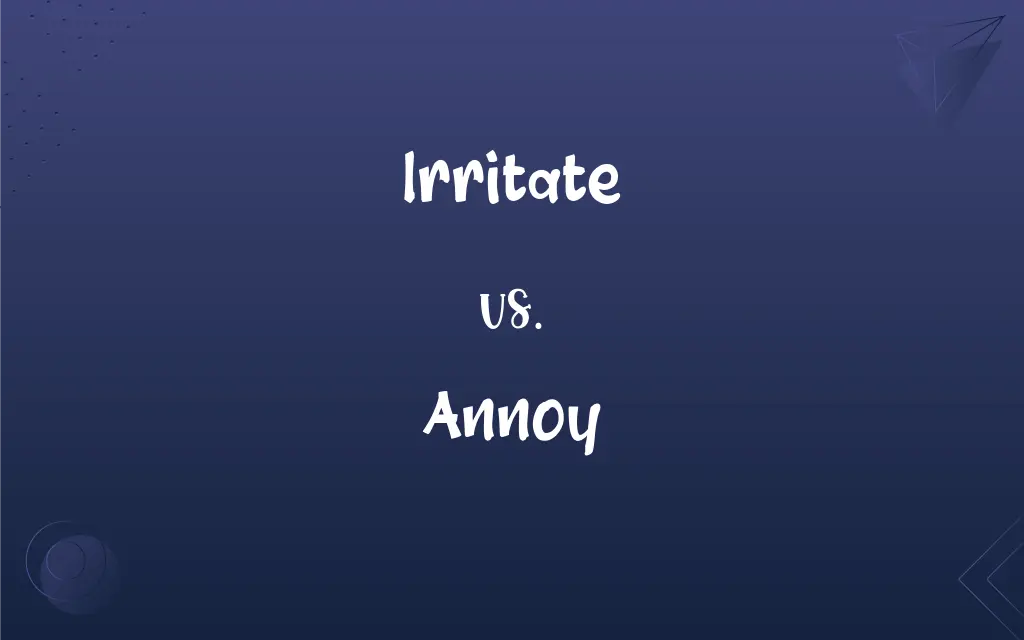Irritate vs. Annoy: What's the Difference?
Edited by Aimie Carlson || By Janet White || Updated on September 24, 2023
"Irritate" often implies a physical or prolonged emotional agitation, while "Annoy" suggests a more fleeting or general feeling of being bothered or disturbed.

Key Differences
1. "Irritate" and "Annoy" are both verbs that denote a form of displeasure or disturbance. While "Irritate" often conveys a sense of causing inflammation, itching, or a prolonged emotional disturbance, "Annoy" is more about a transient feeling of being bothered or disrupted.
2. One can get "irritated" by a rash on the skin or a repeated action that grates on the nerves. The implication is often that the irritation is either a physical reaction or a more enduring emotional response. In contrast, "annoying" factors might be momentary disruptions, like a loud noise or a brief interruption.
3. The word "irritate" can be used in contexts that suggest a stronger, more prolonged reaction. For instance, a product might "irritate" the skin, causing one to seek medical attention. On the other hand, "annoy" might be used to express mild, temporary displeasure, like the buzzing of a fly.
4. In conversations, if someone says they are "irritated," it might denote a deeper level of displeasure than if they were to say they are "annoyed." However, "annoy" can be used more broadly and can range from mild to strong feelings of displeasure.
5. In some contexts, both words can be used interchangeably, but they often carry nuanced differences in meaning. While one might be "annoyed" by a single event or action, repeated occurrences might "irritate" them.
ADVERTISEMENT
Comparison Chart
Definition
To provoke impatience, anger, or displeasure
To disturb or bother in a way that displeases or troubles
Duration
Often implies prolonged disturbance
Generally suggests a more transient disturbance
Usage in Physical Context
Common (e.g., irritate the skin)
Less common
Intensity
Can denote a stronger or more prolonged reaction
Often denotes milder, temporary displeasure
Flexibility
More specific in its nuances
Broader range of usage
ADVERTISEMENT
Irritate and Annoy Definitions
Irritate
To induce inflammation in a bodily part.
Harsh chemicals can irritate the eyes.
Annoy
To harass or trouble.
He's always trying to annoy his sister.
Irritate
To produce persistent small pains or uneasiness.
Spicy foods can sometimes irritate the stomach.
Annoy
To bother or pester.
Don't annoy me with petty complaints.
Irritate
To cause an unpleasant feeling of discomfort.
This fabric will irritate sensitive skin.
Annoy
To disturb or irritate, especially by repeated acts.
The dog's barking annoys the neighbors.
Irritate
To provoke to impatience or anger.
Your constant humming tends to irritate me.
Annoy
To be a source of irritation.
It annoys me when plans change at the last minute.
Irritate
To cause (someone) to feel impatient or angry; annoy
A loud, bossy voice that irritates listeners.
Annoy
To cause discomfort or displeasure.
Bright lights annoy my eyes.
Irritate
To make sore or inflamed
The smoke irritated my eyes.
Annoy
To cause irritation to (another); make somewhat angry.
Irritate
(Physiology) To cause a physiological response to a stimulus in (a cell, body tissue, or organism).
Annoy
(Archaic) To harass or disturb by repeated attacks.
Irritate
To be a cause of impatience or anger.
Annoy
(transitive) To disturb or irritate, especially by continued or repeated acts; to bother with unpleasant deeds.
Marc loved his sister, but when she annoyed him he wanted to switch her off.
Irritate
(transitive) To provoke impatience, anger, or displeasure in.
Annoy
(intransitive) To do something to upset or anger someone; to be troublesome.
Irritate
(intransitive) To cause or induce displeasure or irritation.
Annoy
(transitive) To molest; to harm; to injure.
To annoy an army by impeding its march, or by a cannonade
Irritate
(transitive) To induce pain in (all or part of a body or organism).
Annoy
A feeling of discomfort or vexation caused by what one dislikes.
Irritate
To render null and void.
Annoy
That which causes such a feeling.
Irritate
To render null and void.
Annoy
To disturb or irritate, especially by continued or repeated acts; to tease; to ruffle in mind; to vex; as, I was annoyed by his remarks.
Say, what can more our tortured souls annoyThan to behold, admire, and lose our joy?
Irritate
To increase the action or violence of; to heighten excitement in; to intensify; to stimulate.
Cold maketh the spirits vigorous and irritateth them.
Annoy
To molest, incommode, or harm; as, to annoy an army by impeding its march, or by a cannonade.
Irritate
To excite anger or displeasure in; to provoke; to tease; to exasperate; to annoy; to vex; as, the insolence of a tyrant irritates his subjects.
Dismiss the man, nor irritate the god:Prevent the rage of him who reigns above.
Annoy
A feeling of discomfort or vexation caused by what one dislikes; also, whatever causes such a feeling; as, to work annoy.
Worse than Tantalus' is her annoy.
Irritate
To make morbidly excitable, or oversensitive; to fret; as, the skin is irritated by friction; to irritate a wound by a coarse bandage.
Annoy
Cause annoyance in; disturb, especially by minor irritations;
Mosquitoes buzzing in my ear really bothers me
It irritates me that she never closes the door after she leaves
Irritate
Excited; heightened.
Irritate
Cause annoyance in; disturb, especially by minor irritations;
Mosquitoes buzzing in my ear really bothers me
It irritates me that she never closes the door after she leaves
Irritate
Excite to an abnormal condition, of chafe or inflame;
Aspirin irritates my stomach
Irritate
Excite to some characteristic action or condition, such as motion, contraction, or nervous impulse, by the application of a stimulus;
Irritate the glands of a leaf
Irritate
To vex or disturb in mind or manner.
The noise from the construction site irritates the residents.
FAQs
Can "Irritate" refer to physical discomfort?
Yes, "Irritate" can denote physical discomfort, like skin irritation.
Are "Irritate" and "Annoy" synonyms?
While they are similar in meaning, "Irritate" often implies a more prolonged or intense disturbance than "Annoy."
Can "Irritate" denote emotional disturbance?
Yes, one can be emotionally irritated by repeated actions or behaviors.
Is "Annoy" more temporary than "Irritate"?
Often, "Annoy" suggests a more fleeting or general disturbance than "Irritate."
Are the words interchangeable in all contexts?
While sometimes used interchangeably, they often carry nuanced differences in meaning.
Which word implies a stronger reaction?
"Irritate" often implies a stronger or more prolonged reaction than "An
What's a noun form of "Annoy"?
The noun form of "Annoy" is "Annoyance."
Can a person be described as "irritating"?
Yes, if someone frequently causes annoyance or displeasure, they can be described as "irritating."
Does "Annoy" always indicate a mild feeling?
No, while "Annoy" often denotes milder displeasure, it can range in intensity.
Is it correct to say a substance "Annoys" the skin?
It's more accurate to say a substance "irritates" the skin, indicating physical discomfort.
Can repeated annoyances lead to irritation?
Yes, what starts as an annoyance can escalate to irritation with repetition.
Is it appropriate to use "Annoy" in formal writing?
Yes, "Annoy" can be used in formal contexts to describe a feeling of being bothered.
About Author
Written by
Janet WhiteJanet White has been an esteemed writer and blogger for Difference Wiki. Holding a Master's degree in Science and Medical Journalism from the prestigious Boston University, she has consistently demonstrated her expertise and passion for her field. When she's not immersed in her work, Janet relishes her time exercising, delving into a good book, and cherishing moments with friends and family.
Edited by
Aimie CarlsonAimie Carlson, holding a master's degree in English literature, is a fervent English language enthusiast. She lends her writing talents to Difference Wiki, a prominent website that specializes in comparisons, offering readers insightful analyses that both captivate and inform.































































